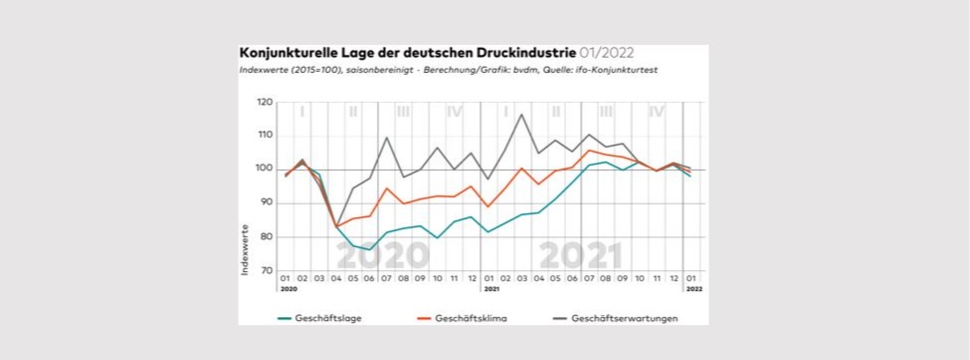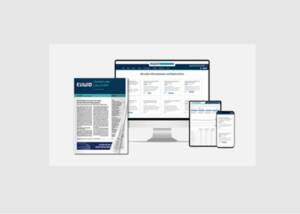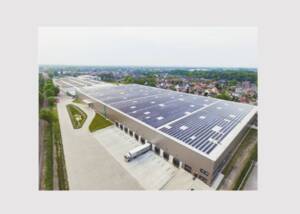bvdm Economic Telegram January 2022: Business climate cools down at the beginning of the year; shortage of materials visibly burdens companies
News General news
After brightening somewhat at the end of the year, the business climate in the German print and media industry clouded over again in January. The business climate index calculated by the Bundesverband Druck und Medien (German Printing and Media Industries Federation) fell by a seasonally adjusted 2.5 per cent to 99.3 points compared to the previous month. It was thus visibly above the previous year's level. However, it was still below its pre-crisis level of February 2020 - the drop was 3.1 points. Persistent supply bottlenecks for intermediate goods are visibly weighing on the current business situation of print and media companies and are severely hampering their production activities at the start of the year.

In January the printing and media companies surveyed by the ifo Institute assessed both their current business situation and their future business performance as weaker than at the end of the year. The values of the current and expected business situation determine the development of the business climate, which is a good leading indicator for the production development of the print and media industry.
After rising by 1.9 per cent in December, the seasonally adjusted business situation index fell by 3.4 per cent in January from the previous month to 98.1 points. The index was about 20 per cent higher than in the same month of the previous year, which was still marked by severe Corona-related restrictive measures. However, it was around 3.7 points below the pre-crisis level of February 2020. Persistent supply bottlenecks for intermediate goods visibly hampered the production activities of print and media companies at the beginning of the year. In fact, 86 per cent of the companies surveyed said they were affected by production constraints. Of these, 83 per cent complained about shortages of raw materials and input materials - an increase of 78 percentage points compared to the previous year. Due to these production obstacles, capacity utilisation in January developed downwards and at 81.2 percent was 1.1 percentage points below the long-term January average.
Due to uncertainty about the duration of the supply bottlenecks, print and media companies were less confident about their expected business performance over the next six months than in December. In January the seasonally adjusted index of business expectations fell by 1.6 per cent to 100.5 points. The index is thus 3.4 percent above its level of the previous year. Currently, only about 10 percent of the companies expect their production to increase in the next three months. About 14 percent expect a decline in their production activities. The majority of respondents do not expect any change in the current production level and therefore do not anticipate a significant weakening of supply bottlenecks in the next three months. Consequently, companies are also cautious about hiring new staff and therefore plan on balance to keep their headcount unchanged in the coming months.










